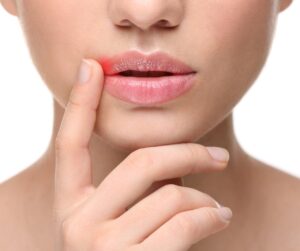What You Need to Know About Cold Sores

Cold sores can be quite a nuisance. They are painful, unsightly and can be embarrassing. They are often mistaken for canker sores or other types of blemishes. If you do have cold sores, it is important to understand what they are, what causes them, and how to treat and prevent them.
In this blog post, we will discuss what you need to know about cold sores, including what makes them different from other types of blemishes, what causes them, how to treat them and how to prevent them from occurring again.
Different from Canker Sores
Cold sores are different from canker sores. Canker sores occur inside the mouth on the softer tissue areas, such as on the tongue, lips, or gums. Cold sores, on the other hand, occur on the outside of the mouth, usually on the lips or around the mouth. They are called fever blisters and are caused by the herpes simplex virus type 1 (HSV-1).
It can be difficult to tell the difference between a cold sore and a canker sore, especially in the early stages. However, once a cold sore appears, it is easier to distinguish as it usually forms a blister, whereas canker sore does not.
Caused by a Virus
As mentioned earlier, cold sores are caused by the herpes simplex virus type 1 (HSV-1). This virus is extremely contagious and can be easily spread from person to person through close contact with infected fluid, such as saliva.
HSV-1 can also be spread by sharing food, utensils, or lip balm with someone who has a cold sore. It is important to understand that even if you don’t have a cold sore, you could still be carrying the virus and could therefore spread it to someone else.
Can’t Be Cured, But Can Be Treated
Unfortunately, there is no cure for cold sores, as the virus stays in the body for life. However, there are several treatment options available that can help to reduce the severity and length of cold sores.
Many over-the-counter creams, such as Abreva, are available that can help to reduce the pain and inflammation associated with cold sores. Prescription medication is also available for those who experience frequent cold sore outbreaks.
Cold Sores Happen When Your Resistance is Down
Cold sores usually occur when your immune system is down, such as when you are stressed, sick, or tired. When your body’s defenses are low, the virus can reactivate, causing a cold sore to form.
To reduce the likelihood of a cold sore outbreak, it is important to practice good self-care. Get enough sleep, manage your stress levels, and eat a healthy diet rich in vitamins and minerals.
Prevention
Preventing cold sores from developing is the best course of action. The herpes simplex virus is highly contagious and can be easily spread to others, so getting a handle on how to prevent the virus from being transmitted is essential.
Hygiene
Hand hygiene is the first line of defense in preventing cold sores. Washing your hands frequently, avoiding touching your face and mouth, and not sharing utensils, cups or lip balm with others are essential in preventing the spread of herpes simplex.
Supplements
In addition to practicing good hygiene, taking supplements such as Lysine and using sunscreen on your lips can help to prevent outbreaks. Lysine is an amino acid that can inhibit the herpes simplex virus and reduce the severity of cold sores.
Get Help with Your Cold Sores Today By Contacting Our Experienced Team
To get more information about cold sore prevention and treatment options available at Swinyer Woseth Dermatology, contact our seasoned skin experts today by calling 801-682-4715 or visiting us online. Our practitioners are here to answer any questions or concerns you may have so you can confidently tackle that pesky cold sore discomfort and gain peace of mind knowing your skin is in great hands!
